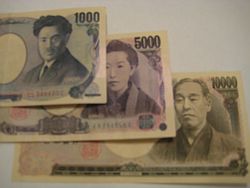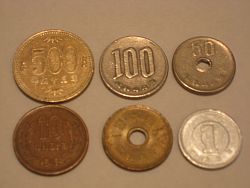Japanese Currency
Japanese currency can be somewhat confusing for first time Japan visitors. Therefore, we have provided the following guide to make help you become more familiar with Japan’s yen currency.
![]()
Denominations of Japan Currency
The currency of Japan is the Japanese yen, which is symbolized as ¥ (or 円 in Japanese).
Japanese money is comprised of bills in denominations of 1,000 yen, 2,000 yen, 5,000 yen, and 10,000 yen. The 2,000 yen note was introduced several years ago, and is not used as commonly as the other denominations.

Japanese coins come in the following denominations:

500 yen, 100 yen, 50 yen
10 yen, 5 yen, and 1 yen
![]()
Cash vs. Cards in Japan
In contrast to the U.S., cash, rather than credit or debit cards, is the most common form of exchange used for retail transactions in Japan. Although most major electronics stores, restaurants, department stores and the like normally accept credit cards, many smaller shops do not, so be sure to have plenty of cash on hand when out and about in Japan.
You’ll also find that when using Japanese yen in Japan, you’ll quickly accumulate coins, especially ¥100 coins. Therefore, it is a very good idea to carry some sort of coin purse with you.
Japanese Exchange Rate
As of the creation of this page (March 14, 2008), the Japanese exchange rate against the U.S. dollar was right around 100 yen per dollar. Thus, using 100 yen per dollar as the exchange rate, it is quite easy to calculate the value of dollars in terms of yen, and vice versa.
Japanese Currency Converter
However, the exchange rate fluctuates daily, so in order to get an exact and updated calculation or find the Japanese exchange rate with other major currencies, use the following currency converter. To use, select the currencies you want to calculate (e.g. From: US Dollar – To: Japanese Yen) and click the “Convert” button.
![]()
